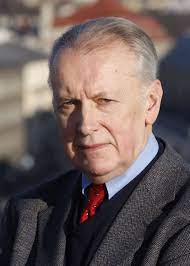Sztompka, Piotr

Bio: (1944-) Polish sociologist. Piotr Sztompka received his doctorate in 1970 from the Jagiellonian University in Krakow, where later he continued his academic career. He was a visiting professor at 17 American universities, including the University of California at Berkeley and the University of Columbia, but also at universities in Mexico, Argentina, Australia, and Europe.
In the early 1970s, Sztompka established a close collaboration with Robert Merton and spent the next two decades developing Merton's theoretical-methodological approach to the functionalist paradigm. Sztompka sees Merton's functional analysis more as a research method than as an analytical tool for explaining social phenomena. Sztompka believes that Merton created a great unified theory. In System and Function (1974), Sztompka argues that functionalist and Marxist approaches are compatible, but that the „systemic-functional” approach is the best basis for explaining both the problems of order in society and problems of changes and conflicts in society. Elements of functionalism that can explain endogenous social change are exploitation, conflict, specific and differential functionalities, disequilibrium, functional disunity, and subsystemic disintegration.
In the books Robert K. Merton: An Intellectual Profile (1986) and Agency and Structure: Reorienting Social Theory (1994) Sztompka moves away from classical functionalism because it does not contain enough cognitive elements and explanations, and neglects the importance of the individual and his autonomy. In Sztompka's synthesis, both the individual and the social sphere have their autonomy, and they are connected by a “unified socio-individual field”, while social events are the basic ontological elements of that field. Neither individuals nor society can be understood as separated from each other because people produce society, but it also produces individuals. In his later works, Sztompka continues to study the relationships between structures and actors and the process of social change. In addition, he studies how the social changes that took place at the end of the twentieth century led to cultural trauma and an increase in the general climate of anxiety, insecurity, and distrust of people and institutions.
Main works
System and Function (1974);
Sociological Dilemmas (1979);
Robert K. Merton: an Intellectual Profile (1986);
The New Technological Challenge and Socialist Societies (1987);
Rethinking Progress (1990);
Society in Action: The Theory of Social Becoming (1991);
Sociology in Europe: in Search of Identity (1993);
The Sociology of Social Change (1993);
Agency and Structure: Reorienting Social Theory (1994);
Trust: A Sociological Theory (1999);
Socjologia: analiza społeczeństwa (2002).

